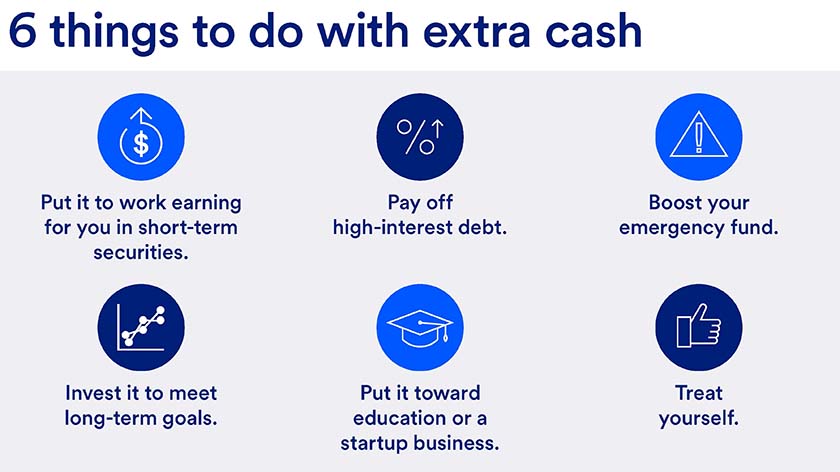Key takeaways
Extra cash from a refund, bonus or other source should be put toward high-interest debt first, such as credit card debt.
Yes, you can treat yourself, but a better strategy is to put most of your additional funds to work in a savings or investment account.
An unexpected windfall is full of possibility. But what’s the best way to use extra cash?
Wherever your extra funds might come from — a tax refund, an inheritance, a bonus at work or even just a buildup of money in your checking account — your first instinct might be to splurge on a Michelin-starred meal or explore the kitchen refurb you’ve been wanting to do for years.
But it pays to pause and consider if there is a financially smarter way to use that extra cash. While it may not bring you instant gratification, using an unexpected windfall strategically might set you on the path to fulfilling a long-held financial goal.
It’s a good idea to sit down with a financial professional to determine what might be best for your specific situation, but here are a few financially savvy ways to use extra cash you could consider in the meantime.
1. Pay off high-interest debt with extra cash.
It may not be the most exciting option, but the smartest thing you can do with a windfall is to pay off or reduce any high-interest debt you’re carrying. This is especially important now with higher interest rates, because your credit card, personal loan or student loan debt could become even more expensive if their interest rates are variable, rather than fixed.
Once you’ve paid off a credit card’s existing balance, put a plan in place to pay off any future balance each month to avoid accumulating more high-interest debt.
2. Put extra cash into your emergency fund.
An emergency fund is important for anyone who wants a financially stable future, because you never know when you might need to cover an unexpected household or medical expense.
The general guideline is to accumulate three to six months’ worth of household expenses. Consider putting it in a high yield savings or money market account, which typically earn more interest than a traditional savings account. Having an emergency fund means that there’s a supply of cash at the ready, so you don’t have to use a credit card or tap your retirement fund if you encounter an unexpected event.
3. Increase your investment contributions with extra cash.
If you’re already free of high-interest debt and are comfortable with your savings, consider using your extra cash to add to your investment accounts.
You could start by increasing your contributions to your employer-sponsored 401(k) or 403(b), or to an individual retirement account (IRA). Try to contribute at least 10–15% of your pre-tax salary each year to your retirement accounts.
If you’ve already maxed out your contributions, consider opening or adding funds to other investment accounts, such as a health savings account (HSAs), brokerage account or automated investing account.
4. Invest extra cash in yourself.
When it comes to investments, one of the best you can make is in yourself. An example would be to save for your education or that of a family member. A 529 plan is a tax-advantaged investment vehicle that grows tax-deferred and remains tax-free as long as funds are used to pay for qualified educational expenses.
If you have entrepreneurial dreams, another way to use extra cash is to jump start your business and turn your dreams into reality. Using extra cash will lessen any business loans you might need as you start and grow your company.
5. Consider the timing when putting extra cash to work.
When and how you end up with a cash surplus can affect what you decide to do with the money.
For example, if you receive an inheritance after a loved one dies, it’s probably coming at an emotional time. In this case, you should take your time and perhaps put the money aside until you feel ready to make decisions about it. Interest-bearing accounts, including money market accounts or certificates of deposit (CDs), can be a good option for short-term saving.
You can also assess your budget against any big expenses that are coming up. If you pay your car insurance every six months, for example, could you use extra cash to get ahead of those payments?
Your extra money may also come in the form of a graduation gift or a holiday bonus. While these are meant to be celebratory gifts, it’s still smart to consider all your options before making an impulse buy.
6. Go ahead and treat yourself with extra cash.
While there are a number of financially prudent ways to use extra cash, it’s also okay to spend some of it on something fun. Just be sure to think it through and make sure your purchase aligns with your overall financial needs and goals.
A smart strategy is to put the money into a savings account and take some time to consider how you want to spend it. You may decide to treat yourself with a small part of it, but use the rest to pay down debt, boost your investments or simply keep saving.
Being thoughtful with money, whether it’s an unexpected windfall or not, is always the best way to achieve your financial goals.
Explore ways to start investing.
Offered by U.S. Bancorp Investments
Explore more
How to set financial goals
Setting and working toward financial goals becomes easier when you reflect on your intentions.

Our goals-focused approach puts you first.
We can help you identify and prioritize your financial goals and design a plan to work toward them, making adjustments as your needs evolve.



